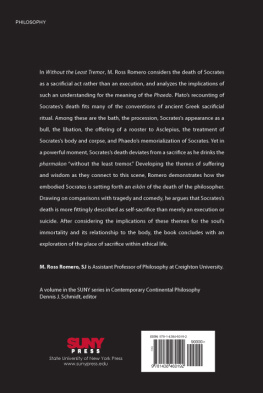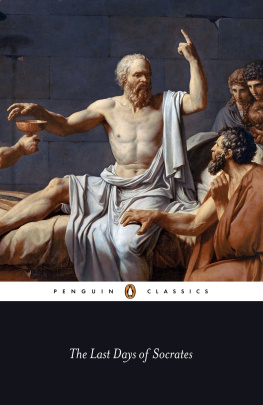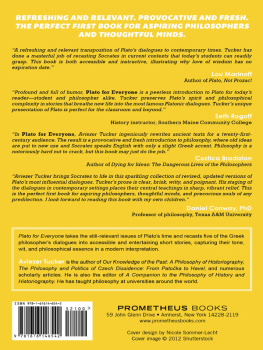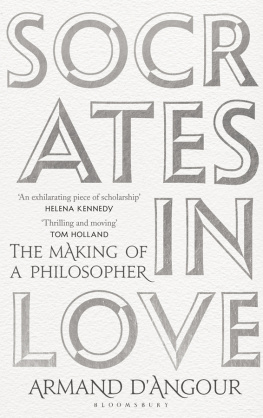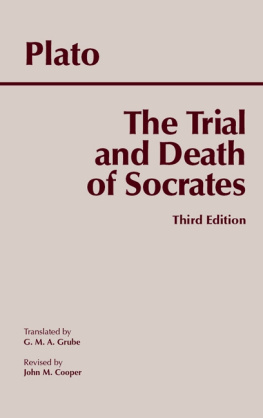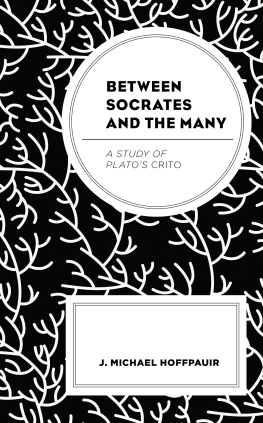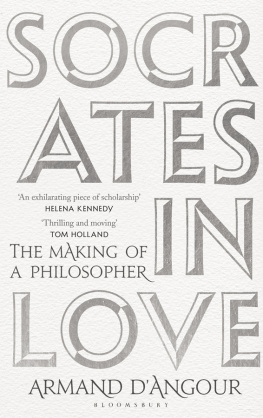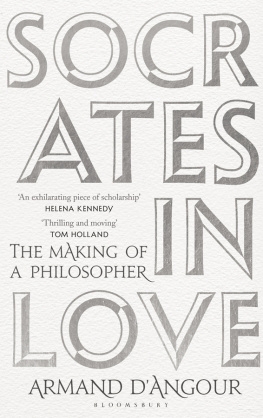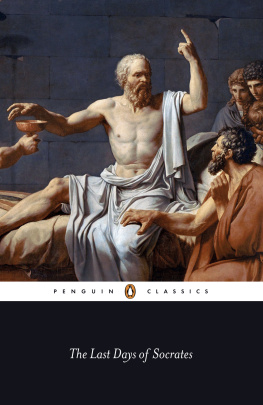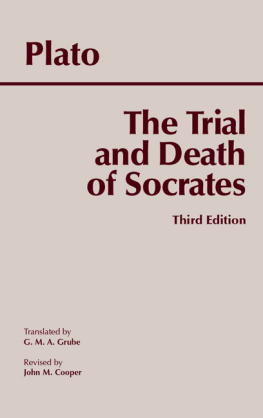Dennis J. Schmidt, editor
WITHOUT THE LEAST TREMOR
The Sacrifice of Socrates in Platos Phaedo
M. ROSS ROMERO, SJ
S TATE U NIVERSITY OF N EW Y ORK P RESS
Published by
S TATE U NIVERSITY OF N EW Y ORK P RESS , A LBANY
2016 M. Ross Romero, SJ
All rights reserved
Printed in the United States of America
No part of this book may be used or reproduced in any manner whatsoever without written permission. No part of this book may be stored in a retrieval system or transmitted in any form or by any means including electronic, electrostatic, magnetic tape, mechanical, photocopying, recording, or otherwise without the prior permission in writing of the publisher.
For information, contact
State University of New York Press, Albany, NY
www.sunypress.edu
Production, Laurie D. Searl
Marketing, Kate R. Seburyamo
Library of Congress Cataloging-in-Publication Data
Romero, M. Ross, [date]
Without the least tremor : the sacrifice of Socrates in Plato's Phaedo / M. Ross Romero, SJ
pages cm (SUNY series in contemporary Continental philosophy)
Includes bibliographical references and index.
ISBN 978-1-4384-6019-2 (hardcover : alk. paper)
ISBN 978-1-4384-6020-8 (e-book)
1. Plato. Phaedo. 2. Immortality (Philosophy) 3. Soul. 4. SocratesDeath and burial. I. Title.
B379.R66 2015
10 9 8 7 6 5 4 3 2 1
For Sid and Ginger, whom I hope to meet again.
CONTENTS
ACKNOWLEDGMENTS

I am grateful to all of my conversations partners for this book. At Creighton University I especially acknowledge Richard White, Elizabeth Cooke, J.J. Abrams, Patrick Murray, Michael Brown, Amy Wendling, Kevin Graham, Jinmei Yuan, Anne Ozar, Chris Pliatska, David McPherson, Bill Stephens, Jeff Hause, Jeanne Schuler, Gene Selk, Randy Feezell, Martha Habash, and Greg Bucher. I am also much indebted to John Sallis, Gary Gurtler, SJ, Martha Woodruff, Catherine Pickstock, Sara Brill, and Dennis Skocz, for their comments at various stages of this project. I especially acknowledge Marina McCoy and Carole Sargent. Many members of the Society of Jesus have offered companionship during this project. In particular I acknowledge Raymond Schroth, Arthur Madigan, Richard Buhler, Charles Kestermeier, Bill Harmless, Jack Cuddigan, Phil Amidon, Tom Shanahan, Tony Rauschuber, Eric Zimmer, Jos Fetzer, Chris Collins, Mark Kramer, Rob Kroll, John Murray, John Montag, and Claude Pavur. At SUNY Press I would also like to thank Andrew Kenyon, Laurie Searl, and Robin Weisberg, as well as the anonymous readers for their comments.
Versions of some of the chapters that form this book were given between 2007 and 2014 at the Ancient Philosophy Society, the Society for Phenomenology and Existential Philosophy, the South Carolina Comparative Literature Conference, and the Jesuit Philosophical Association.
A preliminary study for chapter 3 was published in Epoch: A Journal for the History of Philosophy in Vol. 13, No. 2 (Spring 2009) as Without the Least Tremor: Ritual Sacrifice as Background in the Phaedo.
ONE
WEAVING AND UNWEAVING THE FABRIC OF SACRIFICE
What if the death of Socrates was a sacrifice? How, then, should we take it? A thick fabric with many other questions already interwoven is given. To whom and to what end is this sacrifice made? Is it offered to Apollo? Or to his son Asclepius? Is this sacrifice offered to any god at all, or does it instead reveal something about the fabric of a sacrificial culture in the Athenian polis or the proper relationship of the philosopher to its religious practices? Or perhaps we might take it as the offering of some favor or sign for the companions of Socrates?
Furthermore, if it is a sacrifice, then who is it who makes this offering? Is it the servant of the Eleven who prepares and presides as the pharmakon is brought forth for Socrates to drink? Is it the city of Athens that engages in self-purification by this sacrifice? Or perhaps it is Socrates himself who receives the pharmakon already concocted in the cup and takes it himself without the least tremor and putting the cup to his lips downed it with great readiness and relish (117bc).
Yet, if it is self-sacrifice, then why does Socrates consent to it? Is it merely from a desire to earn a place in someplace after here? Is it from a desire for release from his earthly stateimprisonment in a body as Nietzsche and others would have us take it? Or is it perhaps for some further purpose, a desire to leave a lasting glimpse of philosophy as a means of purification for philosophers yet to come? One might even begin to wonder what it does for those to whom it is given and who receive it as a gift.
Finally, does Socrates give his consent to his own death merely out of obedience to and respect for those who have convicted him and
More than twenty years ago, Jean-Luc Nancy laid hold of sacrifice as whole cloth when he called both the death of Socrates and the death of Jesus by the name sacrifice. Nancy pointed out that, because of the way in which they died, their deaths brought into question this very term and initiated the ongoing fascination of the West with sacrifice.
Both of these figuresthe double figure of ontotheologydeviate decidedly, and quite deliberately, from sacrifice; in doing so, they propose a metamorphosis or a transfiguration of sacrifice. What is involved, therefore, is above all a mimesis : the ancient sacrifice is reproducedup to a certain pointin its form or its scheme; but it is reproduced so as to reveal an entirely new content, a truth hitherto hidden or misunderstood, if not perverted.
For Nancy this new sacrifice in no way merely continues the old; instead, he asks whether this inauguration might require a mimetic rupture? If we follow the thread that holds the death of Socrates to be a sacrifice, then further questions arise in the wake of Nancys pronouncement. Are there particular aspects of a sacrificial ritual that Socratess death reproduces? How does this mimesis appear at the death of Socrates? Then again, how might it deviate decidedly and quite deliberately from ancient sacrifice, as Nancy proposes? What, after all, is this transfiguration, this metamorphosis, this rupture? Finally, what more might be said about this entirely new content that is thereby revealed, the truth hitherto hidden or misunderstood, if not perverted? Although Nancy offers us characteristics that are clearly required and presented by the ontotheology of sacrifice, his reading of the death of Socrates does not In other words, the reader of Nancy is left to ponder: How does this happen in the Phaedo? One wonders in what way the death of Socrates in the Phaedo is both similar to and markedly different than a Greek sacrificial ritual. What does it mean that the death of Socrates appears as both a sacrifice and otherwise than a sacrifice? Might one pick a stray thread from Nancys reading of sacrifice and intentionally weave, unweave, and weave again the fabric of sacrifice in the Phaedo? In this way we might be brought to more carefully discern the elements of sameness and difference in this particular fabric. To discern in this way requires that we mindfully exercise the care, by which we mean vigilance, of the readers of the Phaedo who have come before us.

